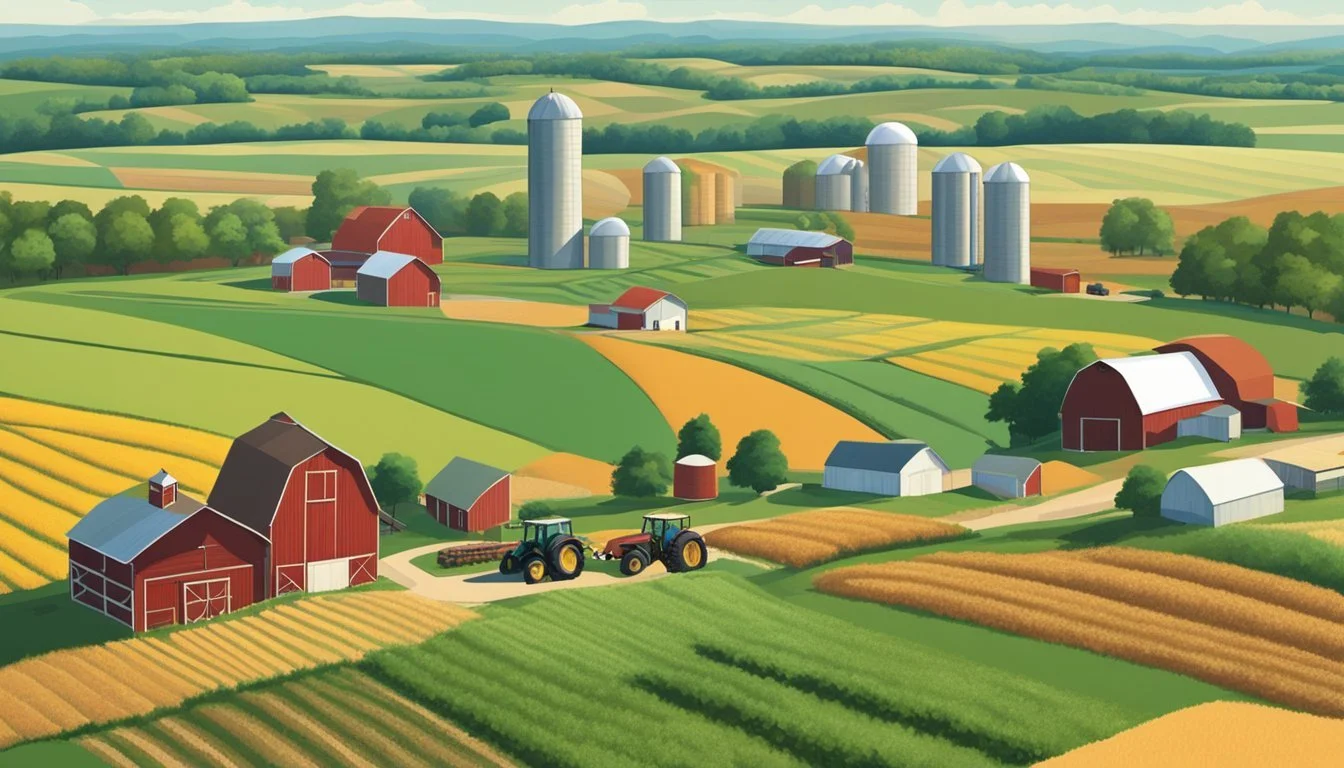Farming Communities in Arkansas
Challenges and Opportunities in Modern Agriculture
Nestled in the heart of the Natural State, farming communities in Arkansas play a vital role in the state's economy and cultural heritage. These communities are characterized by vast expanses of fertile farmland, where crops such as rice, cotton, and soybeans thrive. Diverse agricultural activities are a cornerstone of life here, where both traditional farming methods and modern innovations find balance.
Arkansas boasts a rich history of agriculture, contributing significantly to local and national food supplies. With robust infrastructure supporting farming operations, these communities benefit from a strong network of resources, including cooperative extensions and agricultural research centers. This deeply ingrained agricultural presence not only sustains local economies but also fosters a sense of community and shared purpose among residents.
From small family-owned farms to large-scale agricultural enterprises, Arkansas offers a dynamic landscape for farming. The state's natural resources, including favorable climate and abundant water supply, make it an ideal location for diverse farming activities. As you explore the unique aspects of these communities, you'll discover how they contribute to the vitality and resilience of Arkansas, embodying the essence of rural charm and economic productivity.
History of Agriculture in Arkansas
Agriculture in Arkansas has been a cornerstone of its economy and a key driver of community development. From the establishment of early farming communities to its critical role in the state's growth, the agricultural sector has deeply influenced the region's history.
Development of Farming Communities
Early settlers in Arkansas were attracted by the fertile land and accessibility provided by river transportation.
In Independence County, for instance, inexpensive land drew many poor, displaced rural families. From the early 1820s, pioneers, primarily poor whites, began cultivating this north-central part of the state.
Communities like Chicot and Jerome were established, with farming infrastructures such as barns and sheds being integral components of their landscape. By the early 20th century, these communities had developed robust sub-economies around their agricultural activities.
Key Developments:
Early 1820s: Initial settlements by poor white farmers.
1900-1926: Growth of farming sub-economies.
1930s: Expansion and documentation by photographers like Russell Lee.
Role in Arkansas's Growth
Agriculture has played a pivotal role in shaping Arkansas's economy. As settlers turned swamp and marshlands in the eastern half of the state into fertile farmland, it expanded agricultural opportunities.
The Arkansas Century Farm Program highlights families who have continuously farmed the same land for at least 100 years, showcasing the enduring importance of agriculture in the state.
Established in 1935, the Arkansas Farm Bureau Federation advocated for farmers' rights and interests. By 1936, it had grown to include over 8,000 members, marking its significant influence on the agricultural landscape.
Key Contributions:
Conversion of swamplands into productive farmland.
Establishment and growth of the Arkansas Farm Bureau Federation.
Sustained family farming recognized by the Century Farm Program.
These developments underscore the long-standing importance of agriculture in fostering community and economic growth in Arkansas.
Arkansas's Agricultural Landscape
Arkansas boasts a diverse agricultural landscape, spanning various geographical regions and supporting a wide range of farm types, significant forestry operations, and diverse crop distributions.
Geographical Regions and Farm Types
Arkansas’s agriculture is shaped by its distinctive geographical regions, including the Mississippi Delta, Ozarks, and Ouachita Mountains.
In the Mississippi Delta, fertile soil supports large-scale row crop farming, especially for rice and soybeans.
The Ozarks and Ouachita Mountains feature smaller, family-owned farms focusing on cattle ranching and poultry.
Each region contributes uniquely to the state's agricultural output, leveraging its natural resources for specialized farming practices.
Forestry and Its Economic Impact
Forestry is a critical component of Arkansas’s economy, utilizing over 18 million acres of forestland.
Timber production is robust, with pine and hardwood trees being the primary species.
The forestry sector supports thousands of jobs in logging, processing, and paper production.
It also brings significant revenue, with forestry activities adding considerable value to the state's economy and providing raw materials for various industries.
Major Crops and Their Distribution
Arkansas is a leading producer of multiple crops such as rice, soybeans, corn, and cotton.
Rice fields are predominantly found in the eastern part of the state, specifically the Mississippi Delta.
Soybeans and corn are also widespread in this region, benefiting from its rich soil and favorable climate.
Cotton farming thrives in the southeastern areas, contributing extensively to the state's agricultural economy.
These crops are essential for both domestic consumption and export, making Arkansas a key player in national and international markets.
Crops and Livestock Production
Arkansas is a significant agricultural state, boasting a diverse range of crops and robust livestock industries. Key products include rice, soybeans, poultry, and swine, with cotton and various specialty crops also contributing.
Rice and Soybeans as Staple Crops
Rice is a cornerstone of Arkansas agriculture. The state leads the nation in rice production, particularly in the eastern Delta region. Major producers like Riceland Foods play a critical role in processing and distribution. Given favorable growing conditions, rice farms are both extensive and highly productive. Soybeans are another staple, thriving across numerous counties. They are a versatile crop used in various products, from animal feed to biodiesel. The combination of these two crops ensures a stable economic foundation for many farming communities.
Poultry and Swine Industry
The poultry industry is a powerhouse in Arkansas, particularly in broiler production. The state ranks high nationally, with millions of chickens produced annually. Major companies, along with smaller producers, contribute to this thriving sector. Swine production is also a crucial component, with substantial hog inventories reported. This industry's growth supports numerous jobs and significantly impacts local economies, creating a network of interconnected farming operations.
Cotton, Wheat, and Specialty Crops
Cotton remains a significant crop, especially in the Delta region. Arkansas ranks among the top states for cotton and cottonseed production, driven by longstanding agricultural practices. Wheat, although not as dominant, is cultivated and provides crop diversity. Specialty crops, including fruits, vegetables, and organic products, are gaining traction. The period from 2012 to 2017 saw a notable increase in organic farming, underscoring a growing niche market. These agricultural activities highlight the state's adaptability and the evolving landscape of crop production.
Economic Contributions and Challenges
Agriculture plays a vital role in the economic framework of Arkansas, serving as the largest industry and significantly impacting farm revenue and economic trends. The industry also faces challenges such as natural disasters and changing climate conditions.
Agriculture as the Largest Industry
Agriculture in Arkansas is not just a critical industry; it is the backbone of the state's economy. The presence of 41,900 farms and 18.9 million acres of forests highlights its significance. This industry generates substantial employment and labor income, extending its effects beyond just farming communities.
Various agricultural products, including rice, soybeans, and poultry, contribute to making agriculture a dominant force. Processing of farm products and agriculture-related sectors further enhance its economic impact.
Economic Trends and Farm Revenue
Recent trends indicate a complex but impactful economic landscape for Arkansas farmers. In 2022, $5.5 billion (41.4%) of labor income generated by agriculture went to workers in non-agricultural sectors. Such figures underline the ripple effect of agriculture on the broader state economy.
Though revenue from farm production remains high, expenses such as equipment, seeds, and labor costs continue to rise. Market volatility and trade policies also influence farm revenue, making economic trends fluid and at times unpredictable.
Impact of Disasters and Climate
Disasters and climate changes pose significant challenges to farming communities in Arkansas. Floods, droughts, and extreme weather conditions can devastate crops, leading to substantial economic losses. Climate change continues to alter weather patterns, making farming increasingly unpredictable.
Efforts to mitigate these impacts include adopting resilient farming practices and investing in infrastructure to protect against natural disasters. These challenges require continuous adaptation and significant resources, impacting both short-term and long-term economic stability.
Agricultural Support Programs
Agricultural support programs in Arkansas play a crucial role in sustaining farming communities. Various local and federal bodies provide essential assistance through funding, research, and conservation initiatives.
Local and Federal Assistance
Farmers in Arkansas benefit significantly from local and federal assistance programs. The USDA Farm Service Agency (FSA) offers programs such as crop insurance, which helps protect farmers from losses due to natural disasters. The Arkansas Department of Agriculture runs multiple grant programs including the Farmers Market Promotion Program, providing financial support to community-based farmers markets.
In 2023, the Farmers Market Promotion Program provided $9,000 in funding to support 25 markets. Additionally, the Arkansas Century Farm Program celebrates and assists family farms that have been in operation for over a century, ensuring sustained agricultural heritage.
Research and Development
Research and development are vital for advancing agriculture in Arkansas. The University of Arkansas System Division of Agriculture conducts extensive research on crop improvement, pest management, and organic farming techniques. Their work helps farmers increase yields and adopt sustainable practices.
The Center for Arkansas Farms and Food (CAFF) works on creating a supportive network for farmers. CAFF focuses on innovative farming methods and market connections to support a vibrant regional food system. Their programs aid farmers by providing educational resources and technical training to enhance farm productivity and sustainability.
Conservation and Sustainability Efforts
Conservation and sustainability are central to agriculture support in Arkansas. Programs such as Voluntary Smoke Management Guidelines help manage agricultural burning to minimize environmental impact. The Arkansas Department of Agriculture also promotes soil conservation and efficient irrigation practices to preserve water resources.
Sustainability efforts include the promotion of organic agriculture, supporting farmers who adopt eco-friendly farming practices. Various programs focus on water management to ensure that farming does not compromise local water supplies. These initiatives contribute to long-term environmental health, benefiting both current and future generations in Arkansas's farming communities.
Business and Marketing
Farming communities in Arkansas depend heavily on a well-structured business and marketing framework to thrive. This involves collaboration between processors, businesses, and retailers to ensure local foods reach consumers effectively.
Agricultural Processors and Retailers
Agricultural processors in Arkansas play a critical role in converting raw farm products into market-ready goods. They work closely with local farmers, ensuring that produce meets quality standards. These processors often collaborate with local businesses and retailers to create a seamless supply chain.
Retailers emphasize sourcing from local farms to meet consumer demand for fresh produce. Establishments like the Arkansas Farmers Market Promotion Program support this by helping community markets with promotional expenses. This initiative not only aids farmers but also boosts local economies.
From Farm to Grocery Store
The journey of produce from farm to grocery store involves multiple stages. First, farmers harvest crops that are then collected by processors. These are sorted, cleaned, and packaged to maintain standards. The packaged goods are distributed through various channels, eventually reaching grocery stores and markets.
To support this system, the U.S. Department of Agriculture funds projects to improve food supply chains. For example, a recent $5.6 million grant aims to improve Arkansas's food distribution networks. This funding helps streamline the delivery of fresh produce, ensuring that farmers have access to broader markets.
Marketing and Consumer Dynamics
Effective marketing strategies are essential for success in Arkansas's farming industry. Farmers utilize various techniques to engage with consumers, including community events, social media campaigns, and partnerships with local businesses. Promotions highlight the freshness and uniqueness of local farm products, appealing directly to consumer tastes and preferences.
Consumer dynamics show a growing interest in local foods, driven by a desire for high-quality and sustainably sourced products. Programs like the University of Arkansas's Center for Arkansas Farms and Food train new farmers in these marketing skills. By educating the next generation, they ensure the continued growth and adaptation of Arkansas's agricultural market to changing consumer demands.
Regulatory Affairs and Policy
Regulatory affairs and policy in Arkansas farming communities encompass a variety of local and state regulations, alongside compliance and industry standards. These frameworks ensure sustainability, food safety, and adherence to legal mandates.
Local and State Regulations
Arkansas has a comprehensive set of agricultural laws designed to manage everything from pest control to plant diseases. Among these are the Pest Control Law and Rules, updated in 2019, which mandate how farms should handle pest outbreaks. The Apiary Law and Rules regulate beekeeping practices to ensure the health and safety of bee populations.
Additionally, the Aquaculture Rules and the Arkansas Boll Weevil Suppression Eradication Act highlight the state's focus on both crop and livestock health. The regulations ensure that farming practices align with environmental conservation efforts and economic sustainability. Ensuring compliance with these laws protects local farmers and promotes the state's agricultural integrity.
Compliance and Industry Standards
Compliance with industry standards in Arkansas farming is mandatory for maintaining food safety and quality. The Arkansas Department of Agriculture provides guidelines and resources to help farmers meet these standards. Farmers must regularly update themselves on changes in regulations to avoid penalties and ensure that their produce meets market expectations.
The role of the Arkansas Farm Bureau is pivotal in this context. It offers support and advocacy, helping farmers navigate complex regulatory landscapes. Publications like Ag Insider offer in-depth analyses of policy issues, assisting farmers in staying informed and compliant. With stricter enforcement of regulations, farmers are compelled to adopt best practices, thereby enhancing the safety and quality of food produced in Arkansas.
Community and Education
Farming communities in Arkansas place a strong emphasis on supporting local farmers through education and collaboration. These efforts are critical for maintaining sustainable agricultural practices and ensuring food security across the state.
Role in Supporting Local Farmers
Local communities play an essential role in supporting farmers by facilitating programs that connect them with schools and other institutions. Initiatives like the Arkansas Farm to School Program build valuable relationships between farmers and educational facilities.
The Arkansas Farm Bureau also works to bolster local farming by providing various forms of assistance, including financial support, resources, and networking opportunities. This support helps farmers thrive, contributing to the local economy and food system.
Farmers benefit from these initiatives by gaining greater access to markets for their produce. This not only boosts their income but also promotes the consumption of fresh, healthy, locally grown food within the community.
Educational Resources and Training
Educational resources and training are fundamental in developing a knowledgeable and skilled farming community. Programs such as those offered by the Center for Arkansas Farms and Food (CAFF) provide essential training for both new and established farmers.
Workshops and seminars cover a range of topics, from sustainable farming methods to effective business practices. These training sessions are often organized in collaboration with local universities and agricultural experts.
Moreover, the Arkansas Farm to School Institute offers a unique opportunity for schools to implement farm-based education, linking classroom learning with hands-on agricultural experiences. This not only enriches the curriculum but also inspires future generations to engage in farming.
Support structures like these are critical in ensuring that farmers remain updated on best practices and innovative techniques, fostering a resilient and progressive farming community in Arkansas.
Future of Agriculture in Arkansas
The future of agriculture in Arkansas focuses on sustainable practices and expanding markets globally, ensuring the industry thrives economically and environmentally.
Innovations in Sustainable Farming
Arkansas farmers are increasingly adopting sustainable farming practices to protect natural resources and enhance long-term viability. Techniques such as crop rotation, cover cropping, and reduced tillage help maintain soil health and reduce erosion.
Family-owned farms are at the forefront of this movement, integrating renewable energy sources like solar panels and wind turbines to power their operations. Innovations in biotechnology, including genetically modified organisms (GMOs) and precision agriculture, aid in enhancing crop yields while minimizing environmental impact.
Farmers and researchers at institutions like the University of Arkansas are collaborating to explore and implement innovative solutions. These advancements contribute significantly to the state's economy by increasing productivity and sustainability.
Expanding International Exports
Arkansas is expanding its reach in international markets, significantly boosting the state's agricultural economy. The state exports a diverse range of products, including rice, poultry, and soybeans, meeting global demands.
Family-owned farms play a key role in this expansion by maintaining high standards of quality. Support from state programs and incentives enables these businesses to compete globally.
By improving supply chain logistics and developing better trade relations, Arkansas farmers can ensure efficient delivery of their goods to international customers. Exporters benefit from these efforts by accessing new markets and driving economic growth within the state.









